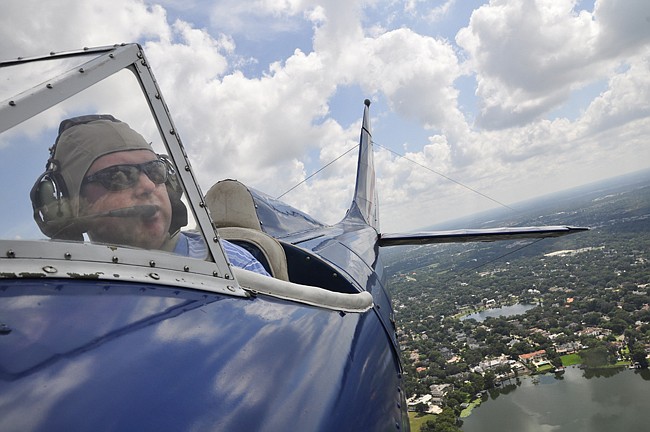- December 26, 2024
-
-
Loading

Loading

The quaint chirping of a starter motor explodes into a roar as 220hp attached to a propeller sends back a windy shockwave and prepares to haul 1,900 pounds of glossy painted history into a swampy Florida morning sky. A pair of quietly giddy passengers, faces framed with leather pilot hats and headphones, stare out at an endless expanse of blue that waits above. Bring your limo-black aviators; It’s throwback time.
The flow of the windblast becomes a cocoon behind the short windshield as passengers hunker down on the two-person bench seat at the front of Miss Liberty. Pilot Rick Blyseth weaves the plane side to side down a taxiway at the quaintly unhurried Orlando Executive Airport, poking his head out of the cockpit to line up for a final check.
A burst of gibberish as Blyseth talks with the control tower, and you hear the magic word, “clear.”
“I’m not a risk taker,” the pilot said before lightly strapping himself into a plane he admits was “just assumed you were going to loop and roll it” when it was built.
“I’m not even an adrenaline junkie.”
Ready for takeoff. He parks a few feet from a runway, stands on the brakes and revs the seven cylinder, 11-liter Continental W670 engine up to full power. The roar shudders through the plane. If there were a Category 6 for hurricanes, this would be it. Peeking above the windscreen, cheeks on faces go full squirrel.
Two turns more and the nose of the three-seat, open cockpit Waco UPF-7 biplane stares down its gateway into the sky, about 325 feet eastbound upwind. For passengers strapped into Florida Biplanes’ open-top thrill-ride into the past, this runway becomes their personal highway to the danger zone. Maverick, you’re cleared for takeoff.
Another roar as throttle linkage to your left grazes your leg and the ground begins to blur. Take a look to the right as commuters on the Spessard L. Holland East-West Expressway (named after Florida’s governor during World War II) get stuck in traffic and you take the express lane. Before you realize the plane’s tail has gently lifted up, the front wheels have already left the ground. And so have you.
The first time Miss Liberty defied the laws of gravity she was training for war. Born March 5, 1941, she was built for one purpose: readying American fighter pilots to take combat to the skies over Europe. The instruments were simple. The controls: a large stick between your legs, a throttle lever and a couple of foot pedals become choreography tools for a dance through a deck of clouds.
Rev it up and get airborne. The wind overwhelms at first (cruise speed is 110mph or so) but the sedateness of the whole experience sets in quickly. You’re riding what for all intents and purposes is an airborne Harley, and you’re cruising Park Avenue from 1,000 feet up. For a little extra they’ll take you into the sky just as the sun’s saying goodnight. Louis Armstrong’s “What a Wonderful World” plays in your head as the clouds paint a tableau of orange, pink and red across your horizon.
It tends to go over well.
“By the end of the flight I’ve had people full-out flying their arms out the window,” Blyseth said.
But that kind of retro serenity might not be for everybody. This plane was made to train fighter pilots. Can Miss Liberty do a barrel roll? Miss Liberty can do a barrel roll. They even have a special flight package for it. Pin the throttle forward, cue the “Top Gun” soundtrack and start howling.
For Mark Grainger, that’s his life for the last four years, but he’s been in the air a lot longer than that. Get Florida Biplanes’ president on the phone and chances are he might pick up from Paris or Seattle. He’s been an airline pilot for decades, and still does it when he’s not running his dream business.
But even after all of Mark’s years in the sky, the more experienced partner here is Miss Liberty.
“She’s been giving rides and flying people nearly every day since 1941,” Grainger said. Only 100 of her kind are left.
The plane was built strong because it was expected to land hard while pilots were training. But with Blyseth at the controls, takeoff and landing feel as if you’ve only moved higher and lower in that same sky you were just in. There is no impact of touchdown like a commercial behemoth.
But still, this isn’t Disney World. It’s as adventuresome as it used to be. There are lap belts, there are radio headphones (half to talk to the pilot, half to keep the noise down) and the helmets are leather. Goggles are optional, and behind the windshield even glasses aren’t necessary.
“It’s the difference between being in a minivan on the highway or being on a motorcycle,” Grainger said.
“Aviation is a niche,” Blyseth said about the enthusiasts for such things. “And this is a niche within a niche.”
Whether that niche is broad enough to convince Central Floridians to take a retro ride in the friendly skies remains to be seen. They’re just getting started. Grainger’s hoping that his already-successful air tours business along the Space Coast is just as well-received in the Orlando area.
For those Disney enthusiasts wary of a more exciting ride, they offer a secret tour that may be the clincher; they can show you a “hidden Mickey” that can only be seen from the air. And if you ask, they’ll take you to find your house.
It’s all about seeing the world a bit differently for a while, Blyseth said.
“The perspective is totally different from up here.”
For more information visit FloridaBiplanes.com
or call 321-392-4125.